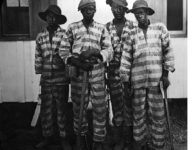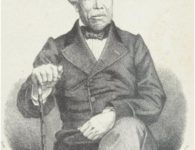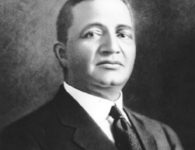Photo credits: © Fabian Bachrach, Andrew Harnik | Credit: AP
Less than one full year after the U.S. Civil Rights Act of 1965 was signed into law, a Black man professionally ascended to an institutional height, which is essentially above the White House and Congress.
This privately-held, Lord High professional institution is called the U.S. Federal Reserve, America’s central bank. Andrew F. Brimmer (pictured left) is the man who was historically chosen in 1966 to help run this multi-faceted financial conglomerate after the landmark passage of anti-poverty legislation in America.
The domestically-run but foreign-owned Federal Reserve totally controls the issuance of America’s currency.
Prior to Brimmer’s March 9, 1966 appointment, no other Black person in America’s history had ever been a member of the U.S. Federal Reserve’s ruling Board of Governors. In addition to controlling the issuance of America’s dollar, the Federal Reserve lays down the law when it comes to both establishing and implementing monetary policy inside America and around the world.
Monetary policy implementation involves influencing finance-related aspects, such as the loosening and tightening of credit, as well as the duty of setting mandates on universal interest rates.
The Fed’s Board of Governors and its Chairperson also assume the role of task master when it comes to making sure that the federal government pays its bills on time and in full. By the time Brimmer joined the reigns with his contemporaries for the Fed’s Board of Governors, the first landmark U.S. banking law was revised numerous times throughout the 19th and 20th centuries.
Brimmer was a well-primed leadership appointee for what at the time was the biggest and most complex central bank on Earth. Born to a sharecropping father in Newellton, Louisana on September 13, 1926, Brimmer pursued a career of dynamic academic fervor after he served time in the U.S Army. He received his bachelor’s degree at the University of Washington in Seattle.
Brimmer graduated with a master’s degree from the same college. His undergraduate and graduate degrees were in economics. After graduate school, Brimmer studied in India after earning a Fulbright Scholarship for his exceptional academic performance. Prior to earning a doctoral degree at Harvard University, Brimmer financially supported himself by performing economic fellowships and other great work.
During his eight-year reign as a central banking administrator, Brimmer was revered as a guru in the category of monetary policy from a global standpoint. His rigid financial morality made him tough on preventing inflation in America. Brimmer also used his power and influence to voice opposition to the way Blacks in America were being economically targeted by the government’s draconian finance-related policies.
Prior to his passing in 2012 at the age of 86, Brimmer remained visible in the national spotlight inside the worlds of academia and finance. He lived long enough to see the first black man be elected to the U.S. presidency (Barack H. Obama, 2008-2016).
However, in a less glamorous economic sense, Brimmer’s appointment to the U.S. central bank’s ruling body gave him more power than President Obama ever had. From 1966 to 1974, the full breadth and width of America’s financial destiny was partially a Black man’s responsibility.
As Mayer Amschel Rothschild (the infamous founding patriarch of the famed German-Jewish global banking dynasty) once said: “Give me control of a nation’s money and I care not who writes its laws.”
Brimmer’s tenure at the Fed put him at the epicenter of the international financial control Rothschild famously spoke to power in the 1700s.



















No comments